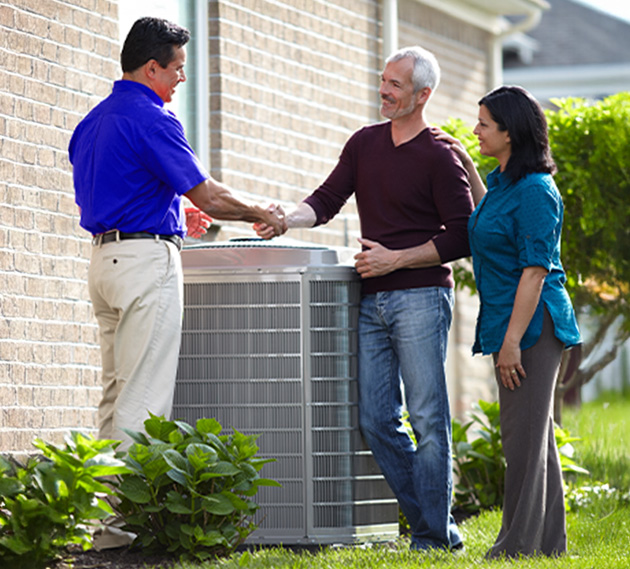Drain Cleaning: The Whole Package
What is the difference between drain cleaning and simply eliminating a clog from your drain line? Often referred to as drain clearing, removing a clog is really only half of the job when it comes to stopping clogs and fixing a blocked drain line. While removing the clog can make the drain move smoothly again, it doesn’t actually get rid of the issue that caused the clog in the first place.
Over time, grime and debris buildup on the walls of your drain line slowly accumulate and build up into a blockage that eventually stops the drain from moving properly. The dirtier your drain line walls are, the faster and easier this happens.
Our drain cleaning service in Dayton and the Miami Valley goes a step further than just removing a clog and getting your drain running again. This process involves not only removing the clog, but cleaning this built-up debris off of the walls of your drain line to prevent further clogs from forming.
While it’s impossible to completely prevent clogs from building, a cleaner drain line is far more difficult for debris to stick to, and that means clogs will disappear from that drain for a long time to come. Even drains that receive high traffic or deal with particularly clog-prone types of waste will see a dramatic benefit from a full drain cleaning service in Dayton or the surrounding areas from the team at Seiter Services!
Signs You Need Professional Drain Cleaning
A clogged drain is more than just an inconvenience; it can be a sign of a larger plumbing issue brewing beneath the surface. While a simple clog can be tempting to fix on your own, several indicators suggest that a professional is needed to prevent more serious damage. Recognizing these warning signs early can save you from a messy and costly plumbing emergency. If you're a homeowner in Dayton, OH, paying attention to these signals is key to maintaining a healthy and functional plumbing system.
- Slow Drains: If you notice that water is taking a long time to drain from your sinks, showers, or tubs, it's a classic sign of a partial blockage. Over time, hair, grease, and soap scum can accumulate, slowing down the flow and leading to a complete clog.
- Gurgling Sounds: Unusual gurgling noises coming from your drains, especially after using a nearby fixture, often indicate trapped air bubbling through a blockage. This is a common sign that the clog is becoming more significant and affecting the rest of your plumbing.
- Unpleasant Odors: A persistent, foul smell emanating from your drains is a clear sign that decaying food, bacteria, or other organic matter is trapped in your pipes. The odor can be a sign of a blockage that needs to be cleared before it becomes a hygiene issue.
- Recurring Clogs: If you find yourself frequently using a plunger or a store-bought chemical cleaner to clear the same drain, it's a strong indication that the problem is not being fully resolved. A professional cleaning can get to the root of the issue and provide a long-lasting solution.
- Water Backing Up: This is a severe and unmistakable sign of a major blockage in your main sewer line or a significant branch line. When using one fixture causes water to back up into another, it means that the wastewater has no clear path to escape and needs professional attention immediately.
Ignoring these signs can lead to burst pipes, water damage, and a costly repair bill. By calling a professional at the first sign of trouble, you can ensure your drains are clear and your home's plumbing system is running smoothly. Don't hesitate to call the expert drain cleaning company Dayton residents trust. We also offer flexible financing solutions to ensure that you get your drains cleaned without worry.
Frequently Asked Questions
What Causes Drains to Get Clogged?
Drains get clogged for a variety of reasons, most of which are a result of everyday use and poor habits. In bathrooms, the most common culprits are a buildup of hair, soap scum, and toothpaste residue. In kitchens, a significant cause of clogs is the accumulation of grease, fats, and food particles that solidify and stick to the pipe walls. For main sewer lines, a major cause is tree root intrusion, where thirsty roots grow into small cracks in the pipes. In addition, flushing non-flushable items like wipes, paper towels, and sanitary products can create severe blockages in any drain.
How Often Should I Get My Drains Professionally Cleaned?
It is generally recommended to have your drains professionally cleaned every one to two years as a preventative measure. This regular maintenance helps to clear out minor buildups before they can escalate into major clogs and backups. We also offer comprehensive maintenenance plans to ensure that your drains flow freely all year-round. However, if your home is older or you have experienced recurring issues with slow drains, a yearly cleaning might be more beneficial. Businesses, especially restaurants and those with high-volume usage, should consider more frequent, scheduled cleanings to avoid disruptions. Ultimately, a professional plumber can assess your specific needs and recommend a cleaning schedule that is right for you. Don't hesitate to call the trusted drain cleaning service Dayton homeowners rely on.
Is Chemical Drain Cleaner Safe to Use?
Using a chemical drain cleaner is generally not recommended and can be more harmful than helpful in the long run. These products often contain harsh chemicals that can corrode and damage your pipes, especially older ones. While they may provide a temporary fix for a small clog, they rarely address the root of the problem and can lead to recurring issues. The fumes from these cleaners can also be toxic, posing a health risk to you and your family. For effective and safe drain cleaning, it is always best to rely on a professional plumber who can use methods like snaking or hydro-jetting.
What Should I Avoid Putting Down My Drains?
To prevent clogs and protect your plumbing, you should avoid putting several common items down your drains. In the kitchen, never pour grease, fats, or cooking oil down the sink, as they solidify and create stubborn blockages. Similarly, food scraps and coffee grounds should be disposed of in the trash, not your garbage disposal. In the bathroom, you should avoid flushing "flushable" wipes, cotton swabs, feminine hygiene products, and dental floss, as these do not break down in your pipes. Lastly, hair and soap scum are major contributors to clogs, so a simple drain screen can be a great preventative tool.







